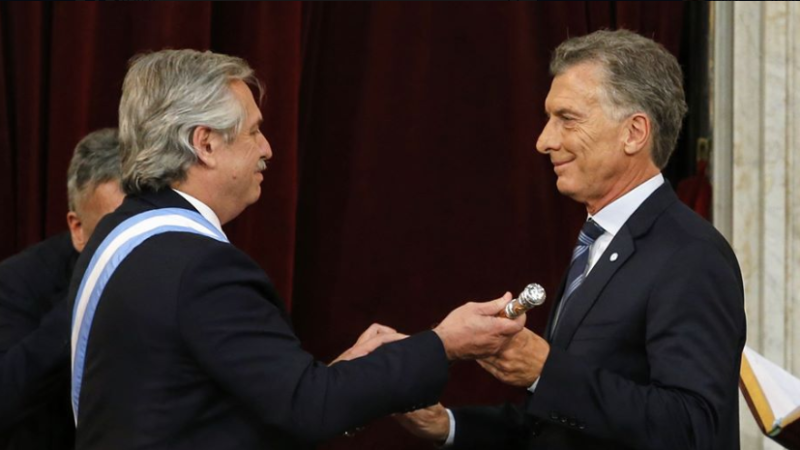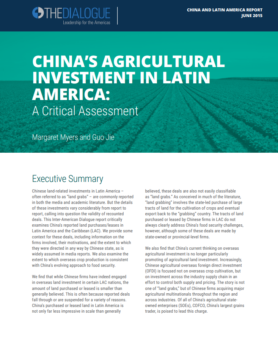The Nationalism of Cristina Fernández de Kirchner
Argentine President Cristina Fernández has increased her appeals to nationalist sentiment to build domestic political support.
A Daily Publication of The Dialogue
Alberto Fernández took office as president on Dec. 10, bringing Peronism back to power in Argentina. What can Argentines expect from Fernández as president? What do Fernández’s cabinet picks say about the direction his government is likely to take? How much will his policies differ from those of the previous administration, and does Fernández have the right plans to address Argentina’s economic woes?
Andrés Malamud, senior research fellow at the University of Lisbon’s Institute of Social Science: “In the last 36 years, Argentina boasted eight presidents and 21 economy ministers. These figures convey one success and one failure. The success is democracy: Argentine presidents, whom generals used to oust at gunpoint, are now ousted by the people at the ballot box. The failure is, well, the economy: with poverty rate of more than 35 percent and inflation at 55 percent, growth prospects look dim, and development, illusory. The combination of success and failure makes up for a sort of Argentine miracle: how is it possible that such a dismal economic performance has not eroded democratic stability? A possible, worrying answer is: not yet. Fernández’s cabinet picks show how aware he is of the ticking bomb he has sat upon. His most urgent task is to renegotiate an unpayable foreign debt, lest there should be another sovereign default. Fittingly, he appointed as minister of the economy a young expert in debt restructuring that has worked closely to Joseph Stiglitz. Also, he must prevent a social explosion by rapidly restarting growth or, at least, domestic consumption. To this end, he has appointed his closest economic aide as minister of production, while at the same time establishing cushion networks with churches and social organizations. Finally, he must walk the tight rope of Peronist politics, simultaneously satisfying his powerful vice president—who nominated him as presidential candidate in the first place—and the provincial governors that are always eager for federal resources. May the force be with him, for the Empire might not.”
Agustín Crivelli, economist, professor and researcher at the University of Buenos Aires: “The return of Peronism to the presidency, and in particular its union behind the figures of President Alberto Fernández and Vice President Cristina Fernández de Kirchner, means a drastic change in the economic, political and social course, and in the strategy of Argentina’s international insertion. In his speech, Alberto Fernández explained in detail the difficult inheritance, in terms of economic matters, that Mauricio Macri’s government left, and in this context, he established a clear order of priorities summarized with the phrase ‘start with the last ones in order to reach everyone.’ First, the urgent problem of hunger must be resolved, thinking next of the necessary policies to reactivate the economic cycle and renegotiate the external debt. The current situation is one of virtual default. It is not possible to deal with interest and capital payments within the agreed terms, much less given the country’s economic and social crises. Undoubtedly, the government will focus on addressing the external debt problem, but first it must focus on achieving the reactivation of the economic-productive cycle. In order to reach an agreement, the International Monetary Fund will have to get out of its traditional adjustment recipes, allowing a change in the dynamics of adjustments, which now translate into higher levels of recession and indebtedness, into a virtuous dynamic in which it is possible to reach a path of sustainable growth that will allow Argentina to meet its commitments with external creditors.”
Megan Cook, lead specialist in the political and regulatory risk/strategic affairs practice at Cefeidas Group in Buenos Aires: “Fernández’s administration will meaningfully shift priorities from those of the Macri government, particularly in terms of social and economic policy, but it will not represent a complete divergence. Fernández’s cabinet includes a mix of younger, fresh faces and longtime politicians. The cabinet shows his strong imprint—most key roles were assigned to close advisors—although positions were allotted with the recognition that he governs in a coalition. Fernández’s immediate priorities will be renegotiating Argentina’s debt while seeking to revive the economy and promote social development. In the short term, he will push for a multi-sectoral agreement on priority measures to address the impact of the economic crisis. The cabinet structure and his inaugural speech also suggest his administration will put renewed emphasis on protecting vulnerable populations and restarting consumption, as well as prioritize the real economy and productive development over the financial sector. Fernández has reiterated his willingness to meet Argentina’s debt obligations, but he will want to negotiate a restructuring more aligned with his prioritization of economic growth and social inclusion. In international affairs, Fernández will likely realign Argentina with leftist governments on some issues, such as Venezuela, but maintain strategic relationships, such as with the United States and China. Fernández begins his term with political capital and a strong position in Congress. However, it is too early to assess how well he will be able to advance his agenda or its impacts. Although Fernández has demonstrated pragmatism, it is unclear if he will be able to consolidate his leadership and sustain this approach while successfully navigating disagreements within his ideologically and geographically diverse coalition. Additionally, the details of many proposals are still unclear, and key posts in the government remain unfilled. As the new administration moves into action, we will get a better sense of its priorities and capacity to govern. In any case, we can expect the coming months to be incredibly challenging.”
Mariano Vila, managing director, and Juan Ignacio di Meglio, public affairs manager, both at Llorente & Cuenca Argentina: “Alberto Fernández has the support of most governors and trade unions and holds a majority in the House of Representatives and the Senate. However, the economic situation facing this new government is not encouraging at all. Indeed, with an annual inflation of 55 percent, poverty reaching 40 percent and 10.1 percent of unemployment, Argentina’s economy is facing a critical situation. Moreover, the most pressing concern for the new administration is foreign debt, which now surpasses 81 percent of GDP. In light of this, it should not surprise us that President Fernández appointed Martín Guzmán, an expert in foreign debt, as the new minister of economy. According to Fernandéz’s statements to the press, Argentina will seek to restructure its debt payments with private creditors and the IMF. It is still too early to know what Fernández’s economic plan will be, but it is expected that it will be based on the increase of some specific taxes (such as taxes on agricultural raw materials and mining exports) and on economic recovery through the increase of private consumption.”
The Latin America Advisor features Q&A from leaders in politics, economics, and finance every business day. It is available to members of the Dialogue's Corporate Program and others by subscription.
Argentine President Cristina Fernández has increased her appeals to nationalist sentiment to build domestic political support.
China is looking for new agricultural investment opportunities in Latin America, but not necessarily for large tracts of land.
Given their close proximity to the United States, LAC countries are well-positioned to capitalize on the surplus of US gas exports and current buyer’s market.
 Argentina’s new president, Alberto Fernández, received the presidential sash and baton at his swearing-in on Tuesday from outgoing President Mauricio Macri (L-R). // Photo: Argentine Government.
Argentina’s new president, Alberto Fernández, received the presidential sash and baton at his swearing-in on Tuesday from outgoing President Mauricio Macri (L-R). // Photo: Argentine Government.

